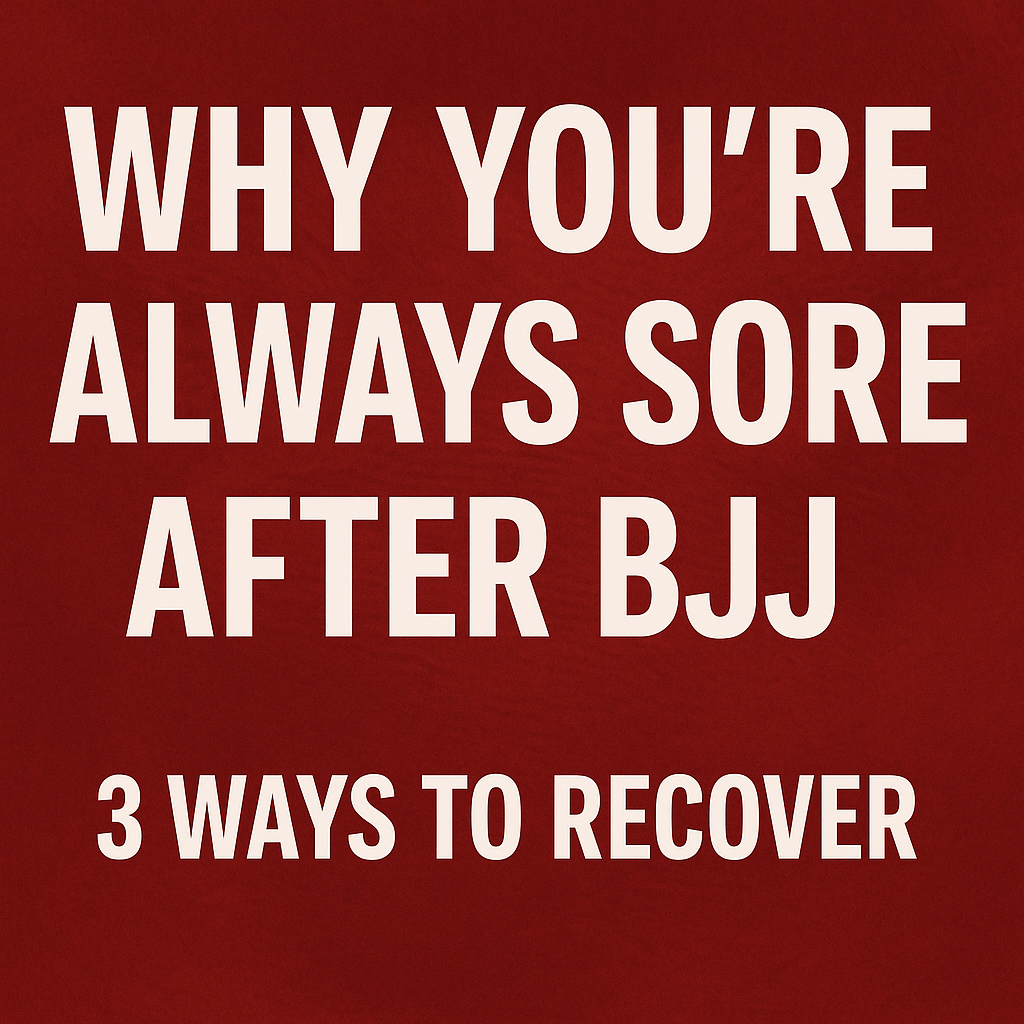Written By; BJJ Black Belt – BJJ Black Belt
Reviewed By: BJJ Black Belt – Dr. Logan Authement, D.C.
Introduction
If you’ve just started training Brazilian Jiu Jitsu, chances are you’ve already experienced BJJ muscle soreness after your first few classes. That deep ache in your shoulders, legs, and back can leave you wondering if something’s wrong—or if you’ll ever feel normal again. Don’t worry—BJJ muscle soreness is completely normal, especially for beginners.
Jiu Jitsu works muscles in ways most people aren’t used to. Even if you’re in shape, rolling introduces new ranges of motion, constant isometric holds, and explosive scrambles that test your endurance. The good news? BJJ muscle soreness means your body is adapting, building strength, and learning resilience on the mats. In this article, we’ll break down why you’re always sore after training, how long that soreness should last, and three proven recovery methods that help white belts bounce back faster.
Why You’re Always Sore After BJJ
Muscle soreness after BJJ—often called delayed onset muscle soreness (DOMS)—is your body’s way of repairing small amounts of muscle damage caused by training. Beginners tend to feel BJJ muscle soreness more because:
-
New movements: Grappling uses stabilizing muscles you may never have trained before.
-
Constant resistance: Unlike lifting weights, every roll is unpredictable, forcing micro-adjustments that stress your muscles.
-
Frequency of training: White belts often want to train every day, which can overwhelm recovery systems.
The key thing to remember is that BJJ muscle soreness is normal, but it shouldn’t be crippling. Sharp pain, swelling, or injuries are a different story. If it’s simply soreness, recovery is your best friend.
3 Ways to Recover from BJJ Muscle Soreness
1. Prioritize Sleep and Hydration
Sleep is the number one recovery tool. Aim for 7–9 hours per night. During deep sleep, your body releases growth hormone, which repairs muscle tissue. Combine this with proper hydration, and you’ll notice soreness fades faster. Even mild dehydration can make BJJ muscle soreness worse, so drink water before, during, and after class. Read this article by Written by | Medically Reviewed by
👉 Tip: Many white belts overlook sleep. Make it part of your BJJ recovery routine, not an afterthought.
2. Stretching and Active Recovery
A structured BJJ stretching routine helps flush blood into sore muscles, reducing stiffness. Post-class stretches like hip openers, hamstring stretches, and spinal twists are particularly effective for grapplers. This is one of the best ways to reduce lingering BJJ muscle soreness.
On off-days, try light movement like walking, yoga, or swimming. This is called active recovery—it gets you moving without adding stress. Foam rolling also helps break up tight spots from hard rolls.
👉 Related: Check out our White Belt Jiu Jitsu Online Hub Page for technique breakdowns that pair well with recovery strategies.
Beginner BJJ Schedule | How Often Should You Train?
One of the biggest mistakes new students make is training every single day right away. While the excitement is great, overtraining is one of the fastest ways to stay sore—or worse, risk injury. Most beginners should start with 2–3 classes per week. This gives your body enough time to adapt and recover, while still building consistency.
Following the right schedule is key to preventing excessive BJJ muscle soreness in your first months of training. As your conditioning improves, you can gradually add more sessions. Remember, recovery is just as important as drilling techniques. We dive deeper into this in our full guide: Beginner BJJ Schedule | How Often Should You Train?.
3. Smart Nutrition and Supplements
Fueling your body properly makes a huge difference in recovery. Focus on lean protein, complex carbs, and anti-inflammatory foods (like berries, fish, and leafy greens). Beginners often ask about BJJ supplements for recovery—some that are widely researched include:
-
Creatine: Helps with muscular endurance and faster recovery.
-
Magnesium: Reduces cramping and improves sleep quality.
-
Omega-3s: Lower inflammation from intense training.
Supplements aren’t required, but they can support your recovery if your diet is lacking.
👉 Related: See our Ultimate White Belt Beginner Blog for tips on balancing training and recovery without burnout.
How Long Should BJJ Soreness Last?
For most beginners, BJJ muscle soreness peaks 24–48 hours after training and fades within 3–5 days. As you train consistently, your body adapts and the soreness becomes less intense. Still, even black belts occasionally feel sore after long competition camps or tough rolls.
If you’re asking, “Should I train BJJ if I’m still sore?” the answer depends. Light drilling is usually fine, but if you’re too sore to move effectively, another day of rest might be smarter. Recovery is just as important as mat time for long-term progress.
Conclusion & Next Steps
Being sore after BJJ is part of the journey—especially at white belt. Remember, BJJ muscle soreness isn’t a setback, it’s a sign that your body is adapting and getting stronger. By prioritizing sleep, staying consistent with stretching, and fueling your recovery with proper nutrition, you’ll bounce back faster and enjoy training more. Over time, BJJ muscle soreness becomes a reminder that you’re growing stronger, both physically and mentally.
If you’re ready to continue your journey, here’s where to go next:
-
✅ Explore our White Belt Jiu Jitsu Online Program for structured beginner content.
-
✅ Read the Ultimate White Belt Jiu Jitsu The Ultimate Beginners Guide for a roadmap from day one.
-
✅ Ready to train in person? Sign up for your Free Trial at Next Generation Martial Arts in Thibodaux.
Your body will adjust. Your soreness will fade. And your growth on the mats will only continue. Keep showing up—you’ve got this.

